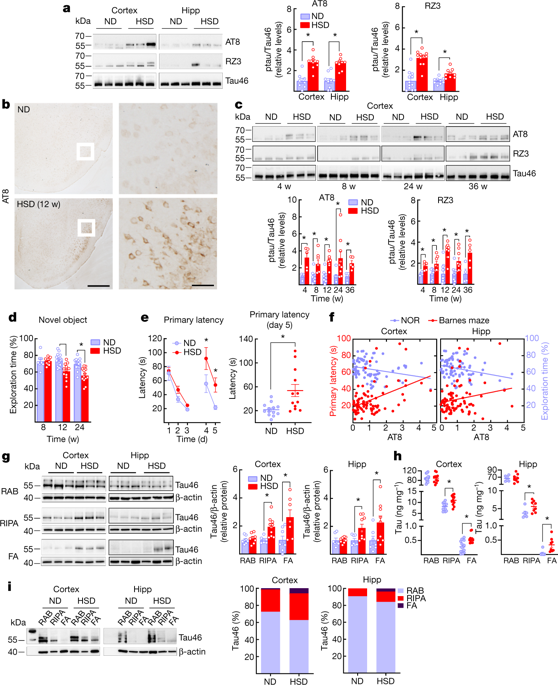Our official English website, www.x-mol.net, welcomes your
feedback! (Note: you will need to create a separate account there.)
Dietary salt promotes cognitive impairment through tau phosphorylation
Nature ( IF 50.5 ) Pub Date : 2019-10-23 , DOI: 10.1038/s41586-019-1688-z Giuseppe Faraco 1 , Karin Hochrainer 1 , Steven G Segarra 1 , Samantha Schaeffer 1 , Monica M Santisteban 1 , Ajay Menon 1 , Hong Jiang 2 , David M Holtzman 2 , Josef Anrather 1 , Costantino Iadecola 1
Nature ( IF 50.5 ) Pub Date : 2019-10-23 , DOI: 10.1038/s41586-019-1688-z Giuseppe Faraco 1 , Karin Hochrainer 1 , Steven G Segarra 1 , Samantha Schaeffer 1 , Monica M Santisteban 1 , Ajay Menon 1 , Hong Jiang 2 , David M Holtzman 2 , Josef Anrather 1 , Costantino Iadecola 1
Affiliation

|
Dietary habits and vascular risk factors promote both Alzheimer’s disease and cognitive impairment caused by vascular factors1–3. Furthermore, accumulation of hyperphosphorylated tau, a microtubule-associated protein and a hallmark of Alzheimer’s pathology4, is also linked to vascular cognitive impairment5,6. In mice, a salt-rich diet leads to cognitive dysfunction associated with a nitric oxide deficit in cerebral endothelial cells and cerebral hypoperfusion7. Here we report that dietary salt induces hyperphosphorylation of tau followed by cognitive dysfunction in mice, and that these effects are prevented by restoring endothelial nitric oxide production. The nitric oxide deficiency reduces neuronal calpain nitrosylation and results in enzyme activation, which, in turn, leads to tau phosphorylation by activating cyclin-dependent kinase 5. Salt-induced cognitive impairment is not observed in tau-null mice or in mice treated with anti-tau antibodies, despite persistent cerebral hypoperfusion and neurovascular dysfunction. These findings identify a causal link between dietary salt, endothelial dysfunction and tau pathology, independent of haemodynamic insufficiency. Avoidance of excessive salt intake and maintenance of vascular health may help to stave off the vascular and neurodegenerative pathologies that underlie dementia in the elderly.A high-salt diet in mice induces cognitive impairment through a signalling cascade that culminates in increased phosphorylation of tau.
中文翻译:

食盐通过 tau 磷酸化促进认知障碍
饮食习惯和血管危险因素促进阿尔茨海默病和血管因素引起的认知障碍1-3。此外,过度磷酸化的 tau(一种微管相关蛋白和阿尔茨海默病病理学的标志)的积累也与血管性认知障碍 5、6 有关。在小鼠中,富含盐的饮食会导致认知功能障碍,这与脑内皮细胞中的一氧化氮缺乏和脑灌注不足有关。在这里,我们报告饮食盐诱导 tau 过度磷酸化,随后导致小鼠认知功能障碍,并且这些影响可以通过恢复内皮一氧化氮的产生来预防。一氧化氮缺乏会降低神经元钙蛋白酶亚硝基化并导致酶激活,进而通过激活细胞周期蛋白依赖性激酶 5 导致 tau 磷酸化。尽管存在持续的脑低灌注和神经血管功能障碍,但在 tau 缺失小鼠或用抗 tau 抗体治疗的小鼠中未观察到盐诱导的认知障碍。这些发现确定了饮食盐、内皮功能障碍和 tau 病理学之间的因果关系,与血流动力学不足无关。避免过量摄入盐分和维持血管健康可能有助于避免导致老年人痴呆的血管和神经退行性疾病。小鼠的高盐饮食通过信号级联诱导认知障碍,最终导致 tau 磷酸化增加。这些发现确定了饮食盐、内皮功能障碍和 tau 病理学之间的因果关系,与血流动力学不足无关。避免过量摄入盐分和维持血管健康可能有助于避免导致老年人痴呆的血管和神经退行性疾病。小鼠的高盐饮食通过信号级联诱导认知障碍,最终导致 tau 磷酸化增加。这些发现确定了饮食盐、内皮功能障碍和 tau 病理学之间的因果关系,与血流动力学不足无关。避免过量摄入盐分和维持血管健康可能有助于避免导致老年人痴呆的血管和神经退行性疾病。小鼠的高盐饮食通过信号级联诱导认知障碍,最终导致 tau 磷酸化增加。
更新日期:2019-10-23
中文翻译:

食盐通过 tau 磷酸化促进认知障碍
饮食习惯和血管危险因素促进阿尔茨海默病和血管因素引起的认知障碍1-3。此外,过度磷酸化的 tau(一种微管相关蛋白和阿尔茨海默病病理学的标志)的积累也与血管性认知障碍 5、6 有关。在小鼠中,富含盐的饮食会导致认知功能障碍,这与脑内皮细胞中的一氧化氮缺乏和脑灌注不足有关。在这里,我们报告饮食盐诱导 tau 过度磷酸化,随后导致小鼠认知功能障碍,并且这些影响可以通过恢复内皮一氧化氮的产生来预防。一氧化氮缺乏会降低神经元钙蛋白酶亚硝基化并导致酶激活,进而通过激活细胞周期蛋白依赖性激酶 5 导致 tau 磷酸化。尽管存在持续的脑低灌注和神经血管功能障碍,但在 tau 缺失小鼠或用抗 tau 抗体治疗的小鼠中未观察到盐诱导的认知障碍。这些发现确定了饮食盐、内皮功能障碍和 tau 病理学之间的因果关系,与血流动力学不足无关。避免过量摄入盐分和维持血管健康可能有助于避免导致老年人痴呆的血管和神经退行性疾病。小鼠的高盐饮食通过信号级联诱导认知障碍,最终导致 tau 磷酸化增加。这些发现确定了饮食盐、内皮功能障碍和 tau 病理学之间的因果关系,与血流动力学不足无关。避免过量摄入盐分和维持血管健康可能有助于避免导致老年人痴呆的血管和神经退行性疾病。小鼠的高盐饮食通过信号级联诱导认知障碍,最终导致 tau 磷酸化增加。这些发现确定了饮食盐、内皮功能障碍和 tau 病理学之间的因果关系,与血流动力学不足无关。避免过量摄入盐分和维持血管健康可能有助于避免导致老年人痴呆的血管和神经退行性疾病。小鼠的高盐饮食通过信号级联诱导认知障碍,最终导致 tau 磷酸化增加。











































 京公网安备 11010802027423号
京公网安备 11010802027423号